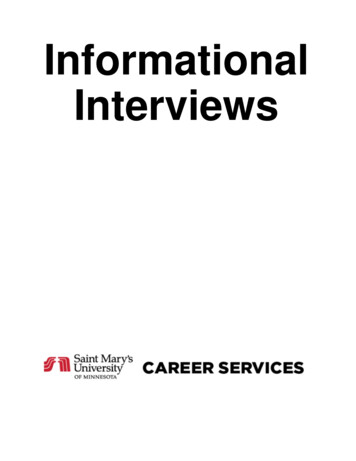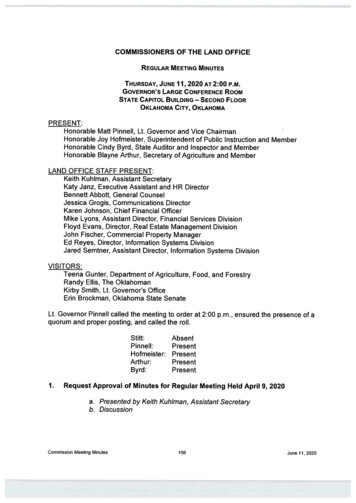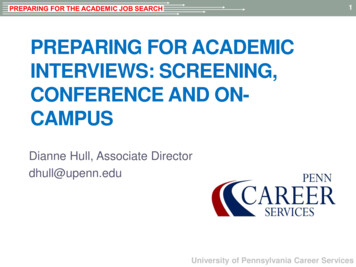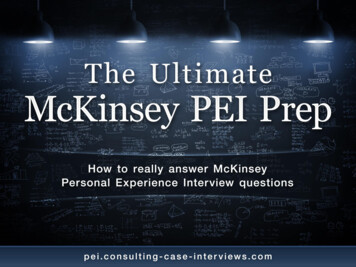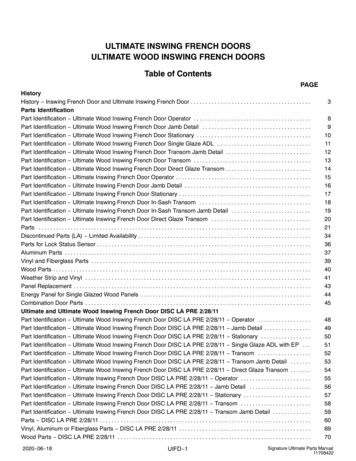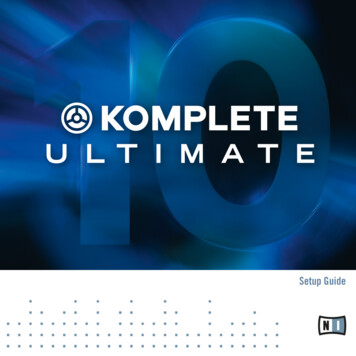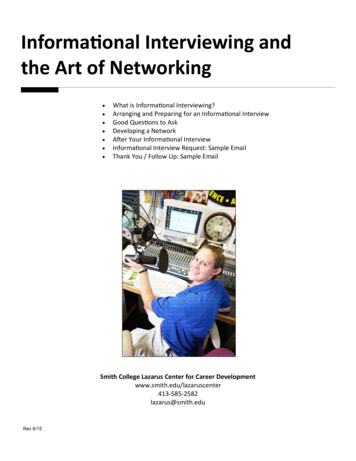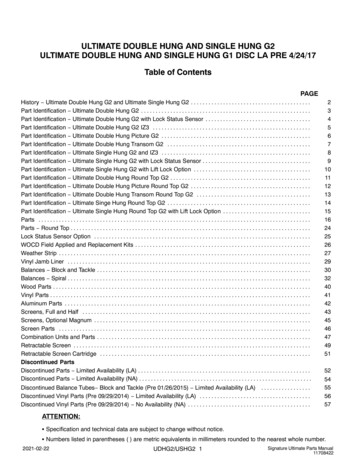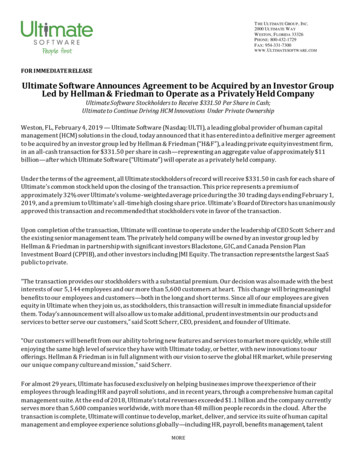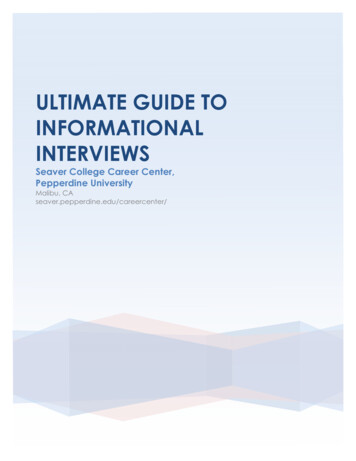
Transcription
ULTIMATE GUIDE TOINFORMATIONALINTERVIEWSSeaver College Career Center,Pepperdine UniversityMalibu, CAseaver.pepperdine.edu/careercenter/
Table of ContentsTable of Contents.1About Informational Interviews .2What is an Informational Interview? .2How Does an Informational Interview Work? .2Benefits .2Responsibilities, as the Initiator .2Let’s Begin .3Introducing yourself through email.3Follow-Up and Give Thanks .4Professional Presentation .4Dress .4Presentation.5Thank You Notes .5Informational Interview Checklist .6Before the Interview .6Interview .6Post,Interview .6Appendix.8Sample Email: Initial Contact, General Purpose.8Sample Email: Initial Email, Company Interest .8Sample Email: Adult/Graduate Student or Alumnus.9Sample Email: Request for Mock Interview .9Sample Questions: Informational Interview .10Sample Note: Thank You Note.11Bibliography .12
Ultimate Guide to Informational Interviews – Seaver College Career CenterAbout Informational Interviews!What is an Informational Interview?An informational interview is an opportunity to gather career and industry informationfrom a professional by asking a series of questions related to the aspects of the specificcareer or job and the professional’s experience. An informational interview is a learningexperience and NOT a solicitation for a job or internship. An informational interview is aconversation with an objective to learn. The activity typically spans 30 minutes to onehour.How Does an Informational Interview Work?As the person interested in seeking information, you are responsible for initiating theconversation, conducting yourself with professionalism, and following-up. The initiation,and corresponding conversation, may take place in-person, over email, or over thetelephone. Additionally, you can conduct an informational interview with anyone –executives, alumni, supervisors, colleagues, friends, family, or family friends!BenefitsIf you’re not sure informational interviews are for you, review the insights and guidancecommonly received by those who reach out to conduct them. Provides direction in choosing a career field or preparing for a career changewith firsthand, up-to-date, insider information,Offers insight to guide future job searches,Prepares you for an upcoming interview,Revises your resume to better fit the specific industry or career field,Allows you to assess your compatibility with a particular career,Expands your professional network,Improves your interviewing skills.-Responsibilities, as the InitiatorBy reaching out to a professional contact with the intent to conduct an informationalinterview, you are responsible for directing the interaction. This responsibility entails thefollowing. Demonstrate desire to explore career options, personal skills and attributes,Generate your own list of questions addressing specific career-related aspectssuch as work environment, career preparation, salary, lifestyle, a typical day,problems, referrals, and advancement as well as questions about the contact’spersonal experiences,Provide the host with your polished and professional resume (upon request),Maintain professional presence and conduct during the entire interview,Coordinate the scheduling of the interview and related details.2
Ultimate Guide to Informational Interviews – Seaver College Career Center-Let’s BeginConversations with mentors can take place over email, on the phone, or in-person.Usually, conversations and informational interviews are initiated through an introductoryemail.Introducing yourself through emailEmail correspondence has become a popular and widely accepted form of businesscommunication. According to Anita Campbell, editor of the Small Business Trendsnewsletter, “62% (of small business owners) believe email is just as effective or moreeffective than in-person or phone communication.” With that in mind, it was only amatter of time before email became a critical component of networking as well.Although we rely on email because we find it safe and easy, communicating throughemail can be tricky. Email is a one-sided conversation and your first email to someone isalso your first impression on that person. This begs the question, “What should I say?”Attempting a “cold call” through email can be challenging, but there are a fewtechniques that can simplify the process. DON’T SKIP THE SUBJECT LINE. To ensure an email is not questioned or deleted asspam, make use of the subject line. Use this to address your specific need orintention, such as “Pepperdine Student Requests Informational Interview”. An emptyor awkward subject line from an unknown email address will be deleted. INTRODUCE YOURSELF. Take a sentence or two to explain who you are and how youcame about getting your contact’s email address. This is especially important forreferrals or online directories. STATE YOUR REQUEST. Ambiguous emails leave little room for response. Explain why KEEP IT SIMPLE. Write a concise email without attachments. Consider your first email CLOSE THE SALE. Include your contact information and ask for an opportunity to SPELLING AND GRAMMAR STILL COUNT. You wouldn’t walk into an interview wearingyou are reaching out for help and describe what you hope to gain from theconnection. Include one or two specific questions that can be answered in aresponse.to be an invitation to connect. Once accepted, you can reply with the specificsand offer to send attachments as needed. Do not attach your resume to thisintroductory email, but have it available if it’s requested.connect again for a more in-depth conversation.sweatpants or introduce yourself to a recruiter with a high-five, so why make similarmistakes in email? Many of us have become accustomed to the shorthand used intexting and instant messages. However, emails, particularly in the business setting,still demand a higher level of professionalism. “Plz send info 2moro” is simply notappropriate. Ever. Spell words as they are spelled and use appropriate grammar,punctuation, and tone.3
Ultimate Guide to Informational Interviews – Seaver College Career Center OTHER TIPS TO CONSIDER: To maximize the effectiveness of your introduction, heedthe following final tips:oooooUse an appropriate email address. If you wouldn’t use it for a jobapplication, don’t use it here.Think office memo. Save the smiley faces and jargon for Facebook.Err on the side of formality. Use capitalization and abbreviations only asnecessary.Spell check. Spell check. Spell check.Mind your manners. Remember that someone is setting aside time for you;don’t forget to say please and thank you.Follow-Up and Give ThanksEmail has provided new opportunities for introductions and networking. Making newconnections has become less intrusive than a phone call and more convenient than aletter. But while it is a swift and efficient means of communication for us, we oftenoverlook the basics. Whenever someone offers guidance or support, we must alwaysremember to thank them. Sending a follow-up note of appreciation goes a long way;forgetting can seem ungrateful and disrespectful. Effective networking depends on theability to create connections with people. Networking through email requires followthrough.!See the sample introductory emails in the appendix.Professional Presentation!When appearing for an interview or meeting, you always want to put your best footforward. Presenting yourself in a professional manner will help you to show that youmean business. Whether you plan to meet with the professional in person, via phone, oremail it is recommended that professionalism be practiced in every aspect. Regardlessof the formality of the specific workplace, it is best that you make a good impression byyour professional presentation. If you are not certain about the specific workplaceexpectations, ask your contact when you schedule a meeting.DressWhen you meet in-person to conduct a professional informational interview, presentyourself in a way that puts your contact at ease. This means, dress appropriately. If youare meeting at a coffee shop, you may dress casually in comparison to meeting in acorporate conference room. To measure the degree of casual for your wardrobe,however, take a hint from your context and use sound judgment. For example,appropriate dress for a coffee shop in Venice, CA on a Sunday afternoon is very differentthan appropriate dress for a coffee shop in downtown Los Angeles on Monday morning.Tips for dressing in a professional environment: In general, dress more conservatively than not.o Men should wear dark pants with a tie (with or without jacket).o Women should wear dark skirt or slacks with a blouse, and closed-toeshoes.4
Ultimate Guide to Informational Interviews – Seaver College Career Center Keep your outfit simple. For a distinctive accent, accessorize with a tie or abeautiful scarf. No matter how carefully you select your wardrobe, the effect is spoiled if whatyou wear is anything less than fresh, clean and in impeccable repair. Starch andiron all clothing. Consider having cotton shirts laundered. Your personal grooming is also key. Come to your meeting freshly showered, withyour hair well attended to. Dress a notch above what you think someone in the profession might wear.-PresentationYour personal presentation is like the cover of a book. It may not be the most accuraterepresentation of its contents, but it’s the source of a first impression. Do not neglect theimportance of making the best first impression. Here are a few tips: Carry a professional portfolio that contains a notepad, pen and copies of yourpolished and professional resume. Use a professional looking pen and pad ofpaper (i.e., avoid using a purple pen or stationery with glitter on it). Use a professional, conservative looking handbag or shoulder bag to carry yourpersonal items. The bag should match your outfit. Preferable colors would beblack, dark blue or brown. Use professional body language and mannerisms when interacting with thecontact. Introduce yourself by shaking hands. Sit upright and attentively whenmeeting with the contact to demonstrate that you are listening. Remember this isa career development activity: pay attention to how you conduct yourself in theworkplace and observe those around you. Reflecting on this afterwards will giveyou more perspective on if the career is a fit for you. While you are meeting with the contact, take the time to observe the dress andprofessional expectations of the workplace. This is an important aspect whenconsidering whether you would be comfortable in a specific career environment.Be aware of how employees communicate with one another, how they conductthemselves in the office and if possible, observe any work documents to observetheir professionalism and presentation. In a phone call meeting make sure you remain attentive, do not have music orother loud distractions in the background. To be safe, make your call indoors in acontrolled environment. In communicating through email please use professional language, refrain fromusing shortcuts in writing (i.e. btw, thanx).Thank You NotesThank you notes are tools to express gratitude. If you ever think that you do not need tosend a thank you note because you thanked them enough in-person, over email, or bybuying coffee, think again. The thank you note is a tangible expression of your gratitudeand leaves a long lasting impression on your contact. This should never be neglected.Here are a few tips:5
Ultimate Guide to Informational Interviews – Seaver College Career Center Write a thank you note to your contact within 24 hours of your meeting orinteraction. Use professional stationery or note cards (avoid kittens, balloons, etc.). ThePepperdine Bookstore is a good source for professional stationery and note cards. Write with black or blue ink. Write out a draft of what you want to say on scratch paper first. The thank you note should be handwritten, neat and legible. Be specific in your thank you note about what you got out of the experience orhow the experience helped you. Try to point out specific examples instead ofusing vague, cliché remarks. Thank the contact for taking the time to meet with you. Send the thank you note to your hostInformational Interview ChecklistBefore the InterviewStrategiesPrepare Logistics for theInterviewResearch your contact’s fieldResearch your career interestsPrepare topics of conversationResearch the contactIdentify your goalsTo-Do List If meeting in-person, develop a list ofrecommended locations. Get information about directions, parking, andmoney for parking. Review current information about the industryand organization of the contact.Sources include:Company web siteNational newspapersRegional business journals (ie, LA Business Journal)Moody’s/Mergent’s Online (available viaUniversity library) Develop your resume and identify your owninterests, skills, and values that you seek in acareer field Compose a list of questions to ask the contact,based on your interests, your research, and the“Sample Questions” listed in the appendix. Learn about the contact’s background inadvance where possible. What, if anything, doyou have in common? What interests you most?Sources include:LinkedInWeb searches Ask yourself, “What do I want to get out of this6
Ultimate Guide to Informational Interviews – Seaver College Career CenterDress to impress Carry cash conversation?”Get a pen and pad of paper for taking notes,copies of your resume, and your questions listIf meeting the contact at his/her place of work,ask about appropriate clothingAlways bring cash in case of parking, or if youoffer to buy coffee or lunch. Never assume plasticwill be accepted.!Interview!StrategiesGetting there on-timeMake introductionsBegin the InterviewDuring the interviewWrap up the interview!To-Do List Give yourself an extra 15-minutes to park, andanother 15-minutes if you’re going to an unfamiliararea Introduce yourself, your goals for the interview, andyour proposed structure for the interview Offer your resume so he/she can become familiarwith your experience Ask the contact to share about him/herself Begin asking questions. A good place to start is with“Tell me about your career journey”. Take notes (this is important. Taking notesdemonstrates that you’re listening) Remember to participate in conversation Relax and enjoy. Ask the contact for other contacts who might beable to provide insight Ask for any other general career advice notaddressed in your questions Ask the contacts to evaluate and discuss yourinterviewing presence and resume Express gratitude for the contact’s time and insight Get a copy of the contact’s business cardPost-Interview!StrategiesExpress gratitudeNurture your new relationshipthrough maintaining contactTo-Do List Write and send a hand-written thank you note tothe address on the contact’s business card Keep in touch through LinkedIn or quick emails,informing the contact on your progress Keep him/her informed if you initiate conversationwith a referred contact!-7
Ultimate Guide to Informational Interviews – Seaver College Career CenterAppendixSample Email: Initial Contact, General PurposeGood morning Jason,I got your email address after reading your profile on the Pepperdine Alumni Networkwebsite earlier today.I am a junior, about half way done with my degree in Biology. I’m interested in learningmore about your lab work and am looking for advice on the best ways to prepare for myown job search.Would you be willing to take a look at my resume and tell me how you got started withyour career planning in order to guide my own planning? I look very forward to hearingfrom you.Thank you,Willy T. WaveSample Email: Initial Email, Company InterestDear Carlos,I received your name from the Seaver College Career Center. I am nearly completewith my degree is in International Business and have concentrated on corporate strategyand marketing. I understand that you play such a role at [Company].I would like to learn about your experience, and perhaps any pointers you might have onhow to best position my resume to appeal to a hiring manager.If you can accommodate my request, I can share my resume as a further introduction. Iam occasionally in the west suburbs and would welcome the chance to meet for coffee.Kind Regards,Willy T. Wave8
Ultimate Guide to Informational Interviews – Seaver College Career CenterSample Email: Adult/Graduate Student or AlumnusDear Mr. Swanson,I am currently halfway done with my degree program and am preparing my job search.My background is in medical devices sales and I would like to extend that into consultingfor the healthcare industry. I see that you have gone through a similar career changeand I am interested in hearing about your experience in an effort to advise my own.Would you be willing to share your experience with me?I look very forward to hearing from you,Willy T. WaveSample Email: Request for Mock InterviewDear Mike:I found you through the Pepperdine University Alumni LinkedIn Group and was hoping wecould connect. Based on your profile, you have a career path that is similar to a path Ihope for myself.I am a student at Seaver College. My focus area is Advertising. I would like to discuss thepossibility of conducting an informational interview and mock interview for my classassignment.Is this something you might consider? I look forward to hearing from you soon.Sincerely,Willy T. Wave9
Ultimate Guide to Informational Interviews – Seaver College Career CenterSample Questions: Informational of-working-in-this-field?-10. career-opportunities?11. n-in-the-industry-over-the-past-5-years?12. ng-to-enter-this-field?13. y-or-in-teams?14. ful-people-in-this-field-possess?15. rrently-and-in-the-future?!16. rships-available?17. '10
Ultimate Guide to Informational Interviews – Seaver College Career Center-Sample Note: Thank You NoteDear Ms. Johnson,Thank you for taking the time to meet with me, answer my questions and forproviding insight about your career field. Our informational interview wasbeneficial to me because I now have more in-depth information about theopportunities available to me and I know the steps I need to take in order tomove forward. I also feel more confident about my career goals thanks to yourdirection. I appreciate all your help and look forward to speaking with you inthe future.Sincerely,Shannon L. Blackwood-11
Ultimate Guide to Informational Interviews – Seaver College Career CenterBibliographyKlopsch, Vicki. “Subject Line: Introducing Yourself Through Email” DePaul University’sCareer Connections 2008Zachary. The Mentor’s Guide: Facilitating Effective Learning Relationships 200012
An informational interview is an opportunity to gather career and industry information from a professional by asking a series of questions related to the aspects of the specific career or job and the professional's experience. An informational interview is a learning experience and NOT a solicitation for a job or internship. An informational .
